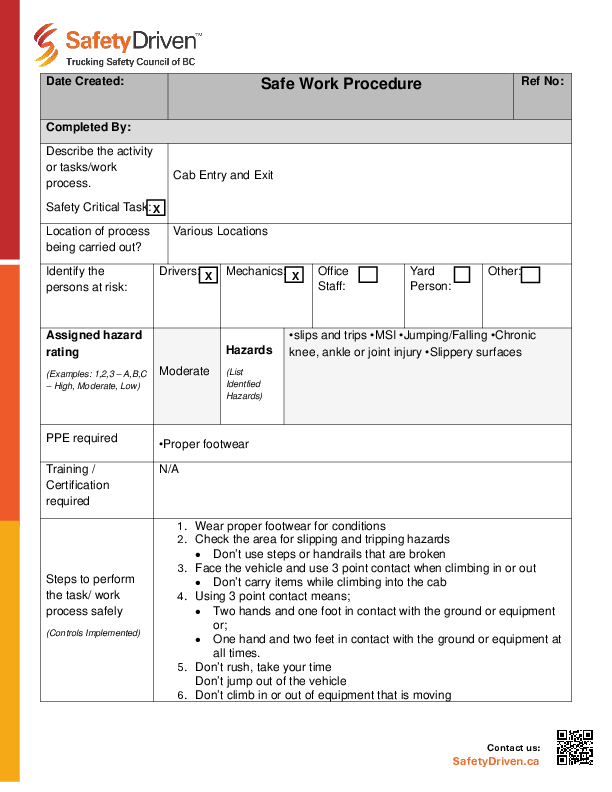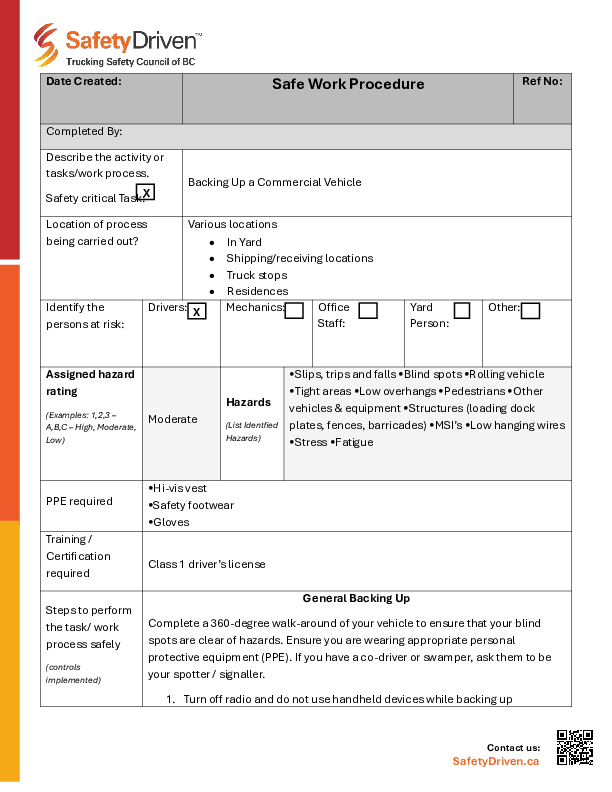
The four specific areas of enforcement.
The National Safety Code (NSC) has four specific areas of enforcement and all company safety policies fall under one of these areas:
- Driver Safety Plan
- Vehicle Safety Plan
- Hours of Services Safety Plan
- A Plan for all Safety Considerations
The driver has the responsibility to ensure that all these areas of the National Safety Code are followed. The Company and holder of the National Safety Code Certificate is responsible for monitoring the driver for compliance to the regulations.
Drivers must be trained to understand their responsibilities for the National Safety Code which include:
- Trip Inspections and written Trip Inspection Report, where required:
- Trip Inspections must be conducted on all vehicles over 5,000kgs and all buses with ten or more passengers.
- Written Trip Inspection Reports must be completed on all vehicles with a Gross Vehicle Weight of 14,600kgs or higher.
- A pre-trip inspection must be conducted on a vehicle before the first trip of the day and at the first rest break after midnight.
- The Carrier (the holder of the National Safety Code Certificate) must monitor the driver for compliance with both conducting pre-trip inspections and recording them on an approved report. The carrier must also have a process for the driver delivering the report within 20 days of when the report was completed.
- Drivers need retraining on conducting pre-trip inspections to keep their knowledge of regulatory changes and technical change to the vehicles. The carrier must also have a plan for this training and record all training on the driver’s National Safety Code file.
- Compliance with the Hours of Service–not working over the maximum hours allowed:
- Hours of Service is regulated for all drivers driving vehicles with a Gross Vehicle Weight of 11,795kgs and higher of buses with ten or more passengers.
- The drivers have to understand the Hours of Service, not operate beyond the maximum driving hours, and also not work beyond the allowable working hours.
- A Carrier must also educate the drivers on the rules and the exceptions to the rules, such as adverse weather provisions, or deferring off-duty hours when required.
- Drivers have to understand that it is not only illegal to work beyond the maximum hours under the National Safety Code Regulations but also very dangerous because of fatigue.
- Hours of Service training must be done regularly to keep drivers apprised of any changes and to refresh the drivers’ knowledge of the rules pertaining to the Hours of Service.
- Driver Safety Plans to ensure drivers drive the vehicles safely, do not damage the vehicle, and do not get any tickets, violations, Notices and Orders, or any roadside suspensions:
- Drivers must understand that an unsafe vehicle must never be taken on the road.
- If a driver does get any of these infractions the company is required to have a disciplinary policy that is progressive.
- Drivers who do not comply with the regulations must be disciplined including up to suspensions and termination.
- Transporting Dangerous Goods safely and with accompanying placards on specified Dangerous Goods Routes.
A little bit more information on infraction prevention:
To prevent drivers from getting any infractions, the Carrier must educate the drivers in all areas of their operations including:
- Load securement
- Pre- and Post -Trip Inspections
- Hours of Service
- Transportation of Dangerous Goods
- Driving Safety, including etiquette, showing courtesy, and professionalism on the road all of the time
- Carrier Policy and Procedures: the Carrier must have a driver policy and procedures manual for all the drivers.
Drivers operating National Safety Code-compliant vehicles have a very important responsibility within the company. The Carrier must ensure that the drivers have the proper tools and knowledge to carry out their duties. Drivers must be trained on all levels of operation within the company and on the road. Drivers must also be included in changes in operations to the company and to make them part of the company team. Drivers are an integral part of company operations but are often forgotten when major decisions are made.
Latest Resources
Safe Work Procedure: Cab Entry & Exit
An Employer can make use of a safe work procedure (SWP) by training new and existing ...
Safe Work Procedure: Backing Up Commercial Vehicle
An Employer can make use of a safe work procedure (SWP) by training new and e ...

